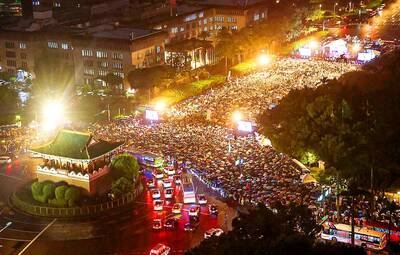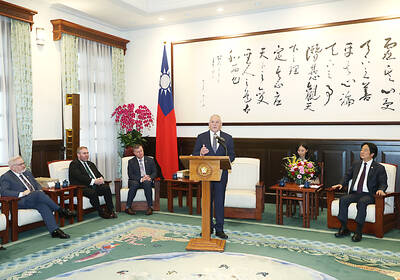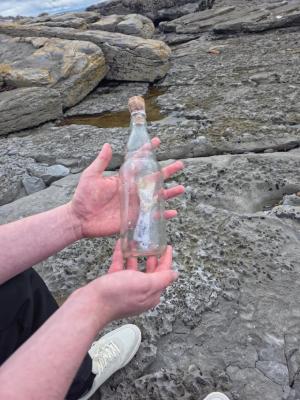Taiwan will avoid military competition with China under his administration, President Ma Ying-jeou (馬英九) said yesterday, defending his efforts to maintain the cross-strait “status quo” against Democratic Progressive Party (DPP) presidential candidate Tsai Ing-wen’s (蔡英文) charges of his possible attempts to seek unification.
Ma, whose talk of a cross-strait peace agreement within the next decade raised concerns about possible political negotiations with China, reiterated his “three noes” policy as the major principle of cross-strait relations during a meeting with military generals, stressing that his administration would prevent war across the strait.
“Faced with the rise of the mainland and its growth in military power, it is impossible and unnecessary to engage in military competition with the mainland. We should work to systematize the ‘no use of force’ part, so that Chinese leaders would be reluctant to solve cross-strait issues via wars,” he said.
The “three noes” policy refers to Ma’s proposal of maintaining the cross-strait “status quo” with no unification, no independence and no use of force.
In recent discussions about cross-strait policies during presidential debates and policy platform presentations, Tsai remained critical of the Ma administration maintaining close ties with China and warned that if Ma were re-elected, Taiwan could face the question of ultimate unification.
In defending the government’s efforts to improve cross-strait relations over the past three years, Ma said that the so-called “1992 consensus” — which refers to an alleged consensus with Beijing on the concept of “one China, with each side having its own interpretation” — is designed to help the two sides of the Taiwan Strait put aside their political differences and focus on cross-strait exchanges.
The signing of 16 agreements under the cross-strait Economic Cooperation Framework Agreement (ECFA), he said, helped revive Taiwan’s economy while maintaining the nation’s dignity.
“No matter what we sign, maintaining the cross-strait ‘status quo’ under the constitutional structure and pushing for peace across the Taiwan Strait under the ‘1992 consensus’ remain our major principle,” he said.
Ma, who is seeking re-election in the Jan. 14 election, yesterday launched another wave of “home-stay” campaigns, visiting local night markets in Chiayi and staying in the city overnight.
He is scheduled to continue the home-stay trip in Miaoli and Taoyuan today and tomorrow before returning to Taipei.
Ma is scheduled to begin a nationwide campaign tour on Tuesday, canvassing in the streets of the eastern cities of Hualien and Taitung, and then continuing to Pingtung, Greater Kaohsiung and Tainan, before holding large-scale campaign parties in Changhua, Taipei, Taoyuan and Greater Tainan on the weekend before the presidential election.

FINAL COUNTDOWN: About 50,000 attended a pro-recall rally yesterday, while the KMT and the TPP plan to rally against the recall votes today Democracy activists, together with arts and education representatives, yesterday organized a motorcade, while thousands gathered on Ketagalan Boulevard in Taipei in the evening in support of tomorrow’s recall votes. Recall votes for 24 Chinese Nationalist Party (KMT) lawmakers and suspended Hsinchu City mayor Ann Kao (高虹安) are to be held tomorrow, while recall votes for seven other KMT lawmakers are scheduled for Aug. 23. The afternoon motorcade was led by the Spring Breeze Culture and Arts Foundation, the Tyzen Hsiao Foundation and the Friends of Lee Teng-hui Association, and was joined by delegates from the Taiwan Statebuilding Party and the Taiwan Solidarity

‘NON-RED’: Taiwan and Ireland should work together to foster a values-driven, democratic economic system, leveraging their complementary industries, Lai said President William Lai (賴清德) yesterday expressed hopes for closer ties between Taiwan and Ireland, and that both countries could collaborate to create a values-driven, democracy-centered economic system. He made the remarks while meeting with an Irish cross-party parliamentary delegation visiting Taiwan. The delegation, led by John McGuinness, deputy speaker of the Irish house of representatives, known as the Dail, includes Irish lawmakers Malcolm Byrne, Barry Ward, Ken O’Flynn and Teresa Costello. McGuinness, who chairs the Ireland-Taiwan Parliamentary Friendship Association, is a friend of Taiwan, and under his leadership, the association’s influence has grown over the past few years, Lai said. Ireland is

Instead of threatening tariffs on Taiwan-made chips, the US should try to reinforce cooperation with Taiwan on semiconductor development to take on challenges from the People’s Republic of China (PRC), a Taiwanese think tank said. The administration of US President Donald Trump has threatened to impose across-the-board import duties of 32 percent on Taiwan-made goods and levy a separate tariff on semiconductors, which Taiwan is hoping to avoid. The Research Institute for Democracy, Society, and Emerging Technology (DSET), a National Science and Technology Council think tank, said that US efforts should focus on containing China’s semiconductor rise rather than impairing Taiwan. “Without

An SOS message in a bottle has been found in Ireland that is believed to have come from the Taiwanese captain of fishing vessel Yong Yu Sing No. 18 (永裕興18號), who has been missing without a trace for over four years, along with nine Indonesian crew members. The vessel, registered to Suao (蘇澳), went missing near Hawaii on Dec. 30, 2020. The ship has since been recovered, but the 10 crew members have never been found. The captain, surnamed Lee (李), is believed to have signed the note with his name. A post appeared on Reddit on Tuesday after a man